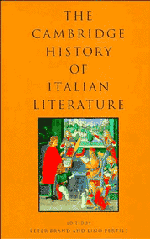Book contents
- Frontmatter
- Origins and Duecento
- The Trecento
- The Quattrocento
- The Cinquecento
- The Seicento: Poetry, Philosophy and Science
- Narrative prose and theatre
- The Settecento
- 22 The first half of the Settecento
- 23 The theatre from Metastasio to Goldoni
- 24 Opera
- 25 The Enlightenment and Parini
- 26 Alfieri and pre-Romanticism
- The Age of Romanticism (1800–1870)
- The Literature of United Italy (1870–1910)
- The Rise and Fall of Fascism (1910–45)
- The Aftermath of the Second World War (1945–56)
- Contemporary Italy (since 1956)
- Bibliography
- References
23 - The theatre from Metastasio to Goldoni
from The Settecento
Published online by Cambridge University Press: 28 March 2008
- Frontmatter
- Origins and Duecento
- The Trecento
- The Quattrocento
- The Cinquecento
- The Seicento: Poetry, Philosophy and Science
- Narrative prose and theatre
- The Settecento
- 22 The first half of the Settecento
- 23 The theatre from Metastasio to Goldoni
- 24 Opera
- 25 The Enlightenment and Parini
- 26 Alfieri and pre-Romanticism
- The Age of Romanticism (1800–1870)
- The Literature of United Italy (1870–1910)
- The Rise and Fall of Fascism (1910–45)
- The Aftermath of the Second World War (1945–56)
- Contemporary Italy (since 1956)
- Bibliography
- References
Summary
Metastasio and melodrama
Metastasio's melodrama is a remarkable expression of some of the main aspirations of the Settecento: the ideal of theatre as a social rite and a vehicle of moral instruction; the nostalgia of scholars for classical tragedy following the French precedent; the hedonism of a courtly society devoted to music. Pietro Trapassi was born in Rome in 1698 of humble parents and died in Vienna in 1782. From childhood he showed an extraordinary talent for improvisation, and he was adopted by Gravina, who oversaw his literary and philosophical education and changed his name from the prosaic Trapassi to the poetic Metastasio. After Gravina's death he moved to Naples, capital of the Austrian Viceroyalty, and was initiated into the musical life of the city by the singer Marianna Bulgarelli (la Romanina) and the composer Niccolò Porpora. He was soon producing compositions for the court, for weddings, birthdays and other occasions, including some dramatic pieces which were very successful. The fashionable mythological idyll was well suited to his liking for the cantabile and sensual poetry of Tasso and Marino, a taste which the severely classical education given him by Gravina had refined but not obliterated.
In his first melodrama, Didone abbandonata, performed in Naples in 1724 (with music by Domenico Sarro), the Virgilian encounter between the Carthaginian Queen and the destined founder of Rome becomes a clash between Dido's unbridled passion and readiness to sacrifice throne and life for the man she loves and Aeneas' anguish as he is torn between love and duty.
- Type
- Chapter
- Information
- The Cambridge History of Italian Literature , pp. 353 - 362Publisher: Cambridge University PressPrint publication year: 1997

